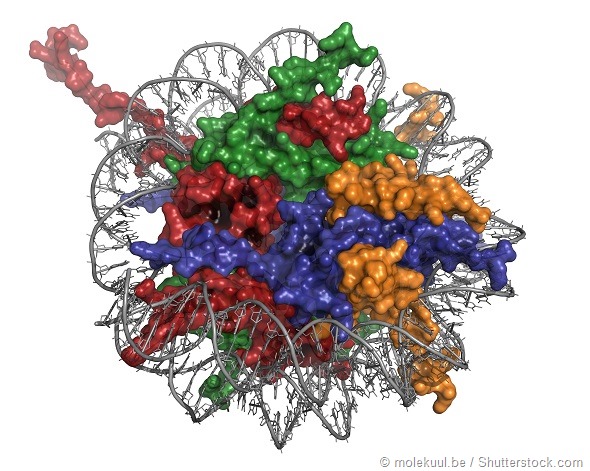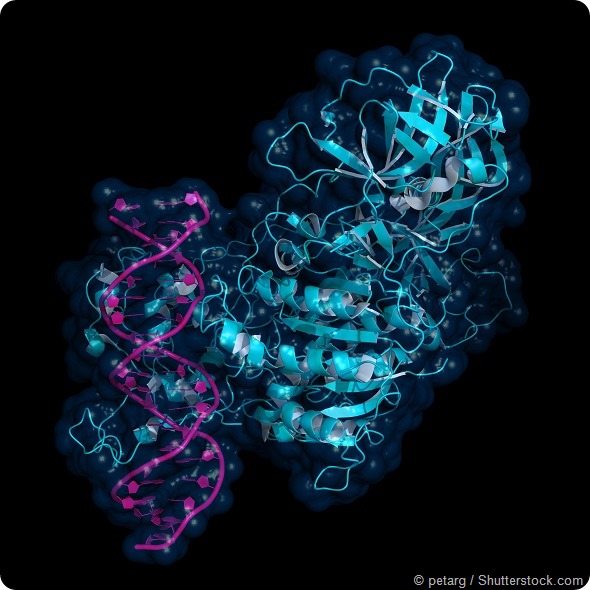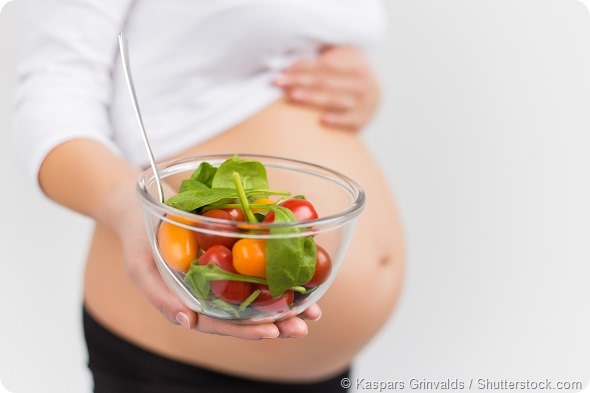In humans, much is already known about the impact of maternal undernutrition during pregnancy, and its impact on growth, development and disease throughout the life course. However, until recently little was known about the effects of the nutritional environment around the time of conception.
The most compelling evidence came from animal models. For example the agouti mouse is obese with a distinctive yellow coat colour. Agouti mice are prone to diabetes and cancer. However, in contrast to pregnant mice fed a normal diet, those fed a diet rich in 'methyl donor' nutrients (vitamin B12, folic acid, betaine and choline) produced leaner, brown offspring that were less susceptible to disease.
It transpired that this was because of epigenetic features known as methyl groups that 'marked' the DNA in every cell in the early developing embryo. In other words, in mice, a mother's diet around the time of conception has a direct effect on her offspring's DNA leading to dramatic changes in appearance and susceptibility to disease.
Evidence for these kinds of effects is of course much harder to come by in humans. One landmark study looked at people born around the time of the 'Dutch Hunger Winter' during the Second World War.
It was already known that these individuals are more prone to cardiovascular disease later in life, and a team of Dutch researchers found evidence of small differences in DNA methylation at a specific gene known to be important in regulating fetal growth.
However, in these studies the critical window of exposure can only be narrowed down to the first 3 months of pregnancy, so it's not clear that periconceptional environment is what is driving the observed changes.
What is the VTRNA2-1 gene and what did your recent research reveal about it?
VTRNA2-1 is a 'non-coding RNA gene' which means that unlike most genes it doesn't code for proteins. Previous studies in humans have suggested that this gene has a role in the regulation of the body's immune response to viral infections. It has also been identified as a tumour suppressor gene with expression of the gene affecting susceptibility to certain cancers.
An investigation led by our US collaborator Dr Rob Waterland indicated that this gene is an example of a 'metastable epiallele' (ME). These are genes whose methylation state is established in the very early embryo, around the time of conception.
Importantly, MEs also show variability between individuals, suggesting that their methylation state might be influenced by the periconceptional (maternal) environment.
We were able to investigate this possibility in a study of 120 infants and their mothers living in The Gambia in West Africa. Our Gambian study setting provides a natural experiment to test the influence of periconceptional environment since this region has a regular pattern of rainy and dry seasons with for example marked seasonal differences in food consumption.
We found that individuals conceived in the Gambian dry season tended to have reduced methylation at the VTRNA2-1 gene in comparison to individuals conceived in the rainy season. Furthermore we observed that these differences persist from childhood into adult life.
Why is the VTRNA2-1 gene thought to be particularly sensitive to environmental factors such as a mother’s diet before pregnancy?
We don't currently know, although we suspect that this sensitivity may have something to do with the type of DNA – the 'genomic environment' if you like – close to the gene.
The period around conception is an important time for the epigenome, as it's the time at which the methylation marks from our parents' sperm and egg cells are reset.
There is some evidence that the genomic environment neighbouring metastable epialleles can influence this process. The mouse Agouti gene's sensitivity to periconceptional nutrition is an example of this.
Could you please explain how epigenetic modifications to DNA control how genes are expressed?
There are various types of epigenetic modification and these can alter gene expression in different ways. For example in the cell nucleus DNA is wrapped around proteins known as histones. Chemical modifications to histones are a form of epigenetic mark that can alter the accessibility of DNA to the gene transcription machinery, thus affecting gene expression.

In our study we looked at a different kind of epigenetic modification – the addition of methyl groups to the underlying DNA sequence – known as DNA methylation. DNA methylation can regulate gene expression in different ways depending on where in the gene it occurs. For example methylation of regions close to genes known as gene promoters tends to decrease gene expression.
This is a key mechanism underlying the maintenance of cellular identify, ensuring for example that different sets of genes are switched on in skin cells as compared to hepatic cells, despite their sharing the same DNA.

How important is the VTRNA2-1 gene thought to be in controlling an individual’s ability to fight viral infections, such as flu, and offering protection against certain cancers?
Recent studies have suggested that VTRNA2-1 has a role in regulating immune response to viral infections through its association with an enzyme known as PKR. It also appears to act as a tumour suppressor gene, and variation in VTRNA2-1 activity has been linked to differential outcomes in acute myeloid leukaemia, lung and oesophageal cancers.
Others have also shown that expression of the VTRNA2-1 gene is affected by its methylation state. It is therefore plausible that the kinds of methylation differences that we observed in our Gambian study could influence a range of health outcomes. We are currently exploring this.
What further research is needed to confirm that a mother’s diet before pregnancy can affect the disease risk of her child?
As with all studies of this type, a vital next step is to replicate these findings in a different set of individuals so that we can be more confident that the effects we have observed are real.
More research is also needed to give us a better understanding of which particular nutritional factors may be driving the epigenetic changes we observe. This requires us to gain a more complete picture of how key nutrients that we know are important for DNA methylation are varying in our population.
However, we also need to remain alert to the possibility that there may be seasonal factors other than maternal diet influencing VTRNA2-1 methylation in the population that we are studying. These are all lines that we are actively pursuing.
What advice would you give to women who are looking to conceive in the near future?
First of all, it's important to point out that our research on periconceptional epigenetic mechanisms complements, and doesn’t replace other evidence-based guidelines for good nutrition throughout pregnancy. So the best advice is to maintain a nutrient-rich diet throughout pregnancy including pre-conception.

In terms of our research on the impact of nutrition around conception, my opinion is that research in this area has not yet advanced sufficiently to be able to advise mothers-to-be on specific nutrients or foods they should be consuming. The clearest evidence remains that on the use of folic acid supplementation for the prevention of neural tube defects.
Over what time period is the diet thought to have an effect?
There are a number of issues that we need to consider when discussing dietary effects on the epigenome. Firstly, although our studies on the influence of periconceptional nutrition suggest that epigenetic effects can occur across multiple tissue types, depending on the timing and nature of the dietary exposure these effects may occur within specific tissues only - for example in liver or fat cells.
It's also important to be aware that certain exposures including diet may affect the epigenome, and yet may have little or no effect on health.
Finally it's possible that dietary effects on health could in turn impact the epigenome – a type of 'reverse causation'.
This is an active area or research so the picture is changing all the time. My feeling is that distinct sets of genes are likely to be sensitive to different dietary factors at different critical windows throughout the life course.
Where can readers find more information?
About Dr Matt Silver
Dr Matt Silver is a member of the UK Medical Research Council's International Nutrition Group (ING), based at MRC Unit, The Gambia, and at the London School of Hygiene and Tropical Medicine.
ING's mission is to gain novel insights into the basic mechanisms linking diet and disease in order to develop more effective community and clinical interventions.
Much of the group’s work is conducted at a field station in rural Gambia, the result of an exceptional partnership between the MRC and local people stretching back almost 70 years. Matt obtained his PhD in bioinformatics / statistical genetics at Imperial College, London.